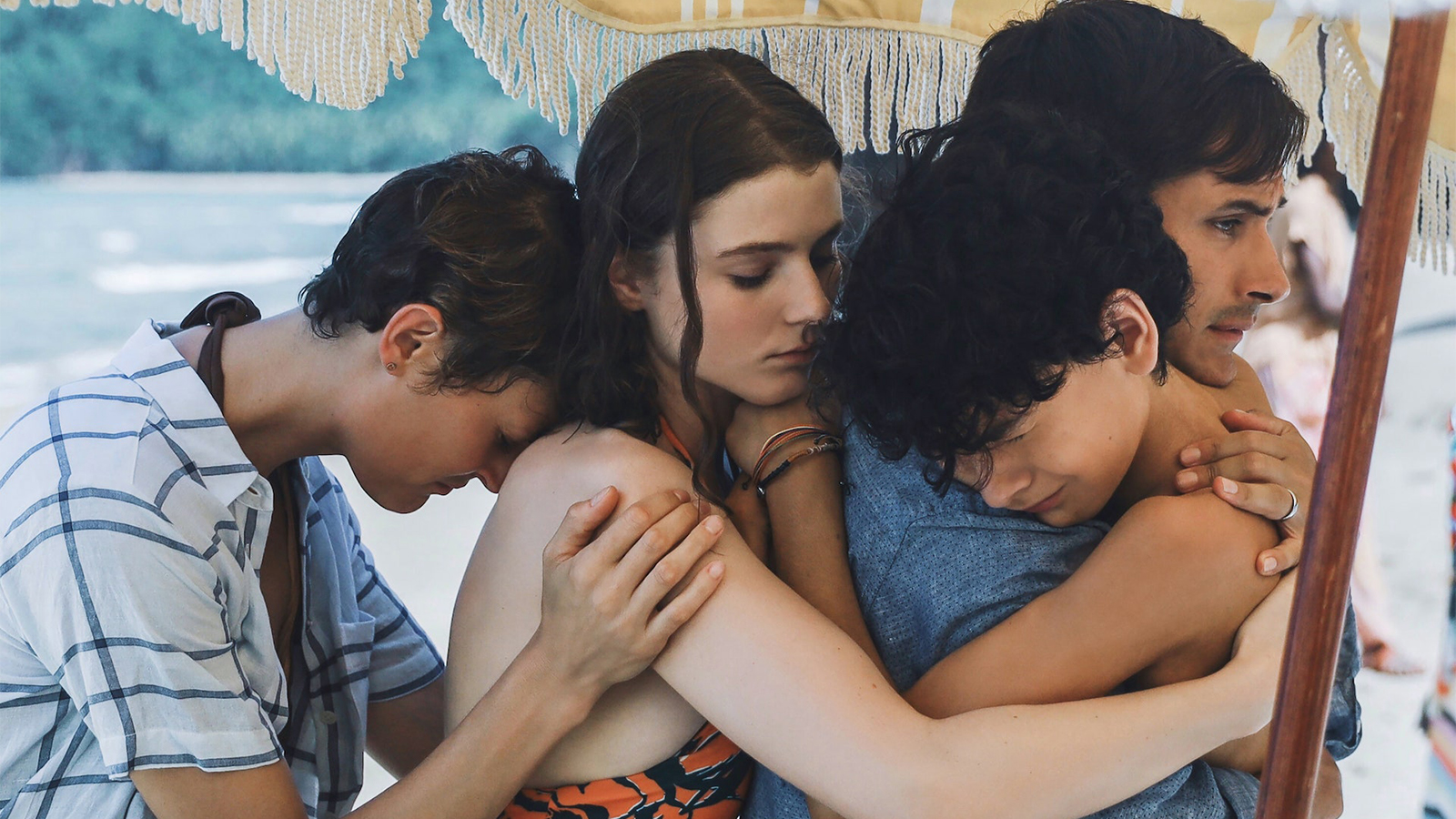Old (M. Night Shyamalan, 2021). Photo Courtesy of Phobymo/Universal Pictures I wanted to see Old for the simple, stupid reason that I am also old(ish). If I’m being honest I wanted to see how grotesque things would get. Old, after all, comes from the mind that concocted The Visit, a film whose “scary grandparents” premise involved a not insignificant number of adult diapers. Even though this is incredibly ageist, I’m not complaining. We olds do not get much in the way of movie representation, besides Amour and a smattering of British actors, so I looked forward to seeing what M. Night Shyamalan, king of twists, would do with his latest escape room, where a group of people find themselves trapped on a beach whose surprise key feature is accelerated aging. Would there be a way out? And, short of a time machine, how could anyone outrun their own sagging body? Would there be a time machine? The setup is this: three families staying at a luxury resort are brought to the secluded beach for what is promised to be a day trip, and what a day! The pace of aging is roughly two years per hour, which is fast enough to observe cuts turn instantly to scars, but slow enough that it takes several years of beach-time before anyone notices that the kids’ bathing suits have gotten uncomfortably snug. The time effects happen only on a “cellular level,” an explanation both vague and oddly precise, and which basically means people get old without having to eat all the time. Still, I wondered how aging, or maturity, could happen without experience. Would the children have kid minds in their new adult bodies? Do the girls menstruate? What happens when you witness multiple gruesome deaths, many of which have nothing to do with old age, all within the span of a dozen hours? Before the film dwells too long on any question it raises, a character screams at having discovered another corpse, and the camera swing-pans away. As it turns out, there aren’t that many old people in the movie. Only one AARP-eligible person sets foot on the beach: Agnes (Kathleen Chalfant), who barely has any lines beyond imploring her dog to sit. (Poor dog; let us not even mention the computational horror of accelerated terrier aging.) She has come with her racist surgeon son Charles (Rufus Sewell), his trophy wife Chrystal (Abbey Lee), and their 6-year-old daughter Kara. This vain brood is the foil to the politely bourgeois Cappas: parents Prisca (Vicky Krieps) and Guy (Gael García Bernal), who age with little more than a few elegantly placed wrinkles, and their children, 6-year-old Trent and 11-year-old Maddox. Rounding out the forced-retirement community is rapper Mid-Sized Sedan (Aaron Pierre), therapist Patricia (Nikki Amuka-Bird), and nurse Jarin (Ken Leung). Though it’s ostensibly an ensemble piece, the film’s real interest is the precocious, irritating Trent, whose tousled locks look suspiciously like the director’s. Played by four different actors, he ages considerably, but never appears worried about his own changing body. Old isn’t concerned with the horrors of aging so much as the effects that other people’s aging bodies have on Trent: all the ways that adults, and specifically his parents, fail him. In Shyamalan’s films, adults abandon the children who desperately need their protection. It’s a need Trent never grows out of, even when he’s fully grown. The tragedy, if there is one in this decidedly unserious movie, is that once a parent is gone, no one can step into their role. Unsurprisingly, the makeshift beach community disintegrates. Shyamalan has long had a dismal view of collectivity, and for him, groups of unrelated people spell contagion (The Happening), deceit (The Visit, The Village), and chaos (Split). When Maddox excitedly spots Mid-Sized Sedan leaning against the rocks, her father tells her not to bother him; the moment neatly describes Shyamalan’s isolationist worldview. The filmmaker has prescribed sheltering with the authentic family to weather the alien invasion, the plant rebellion, or the beach that makes you old. When that tightly knit unit collapses, there is nothing left to hold onto. With its multiethnic, accented cast, Old is a grim, half-baked parable for a world emerging tentatively from a pandemic. Go back inside, it seems to whisper. But on a sweltering July night, I was more persuaded by the crowd of mostly teenagers who packed the theater. It felt great to be out watching a big, silly movie. At the moment of the Shyamalan twist, one man leapt up and started clapping. “My man!” he bellowed appreciatively at the screen, his mask lowered beneath his chin. I tried to imagine him on the Old beach, cheering on every escape attempt with the beaming pride of a dad at his kid’s T-ball game. But the image just didn’t work, not because it was too ridiculous, but because such boundless enthusiasm had no place at Shyamalan’s weird and hostile resort.
